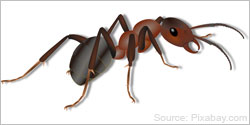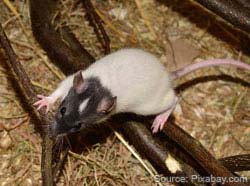 Insects, rodents, and various vermin can wreak havoc on our lives-whether it's just one or two offenders or a total infestation, no one wants to share their home with pests. Pesky, disease-spreading and downright disgusting, there are numerous factors that can make your home appealing to ants, roaches, flies, stink bugs, moths, beetles, mice and rats.
Insects, rodents, and various vermin can wreak havoc on our lives-whether it's just one or two offenders or a total infestation, no one wants to share their home with pests. Pesky, disease-spreading and downright disgusting, there are numerous factors that can make your home appealing to ants, roaches, flies, stink bugs, moths, beetles, mice and rats.
Read on to find out how to prevent pests from creeping and crawling into your home so you can avoid an infestation before it begins.
Keep it clean
A messy, unsanitary home is a pest haven. The odors will bring them, and the clutter serves as a desirable breeding ground. Sinks full of dirty dishes, bathrooms piled with dirty clothes and wet towels, or unattended food and related trash will attract ants, flies, and other vermin. Keeping your home spic and span will definitely help eliminate pest problems. Promptly throw away candy wrappers, wipe up sticky spills immediately after they occur, and do dishes and laundry regularly.
Take out the trash
An overflowing garbage can full of several days' worth of decaying food and other trash is a pest magnet. Your trash should be emptied every day to prevent insects or rodents from dining on your leftovers. You should also opt for a secure, lidded trash receptacle and odor-proof garbage bags.
TIP: Keep your outdoor cans a significant distance away from your house to limit pest attraction in close proximity to your home.
Leave fruit in the fridge
While you may want to leave your fruit out to ripen, the sugar is a favorite of pests like gnats, flies, and ants. Keep fruit in your refrigerator-especially once it gets ripe-to prevent swarms of insects from feasting upon it.
Keep food sealed
Any opened containers of non-perishables-such as cereal, pasta, grains, flour, cake mixes-should be properly and securely sealed in your pantry. Many starchy foods, nuts, and spices attract pests such as roaches, moths, or grain beetles-especially in humid or tropical climates. The infestation often occurs before the item's purchase and spreads to other foods in the pantry. Make sure to inspect foods often and always keep containers well-sealed.
Keep it dry
Pests are drawn to moisture and humidity-stagnant water or wet towels and clothes are a major attraction. Wipe up spills right away, check often for leaks and repair them promptly, and make sure your laundry room, kitchen and bathrooms are always clean and dry.
Keep it secure
Make it difficult for pests to gain access to your home by routinely checking for gaps, openings, or other ways inside. Check behind cabinets, appliances, and around vents and seal all cracked baseboards, pipes, and ducts with caulk or any other sealant. Go outside and carefully inspect your home for cracks or gaps. Caulk door frames, window frames, and any visible cracks on your home's surface. Check for rips or holes in window screens or cracks in the glass and make the necessary repairs. The optimal window screen for keeping pests out has a mesh size of at least 200 holes per square inch.
Clear the outside
 Overgrowth, mulch, chopped wood, and other debris can become breeding grounds for pests-which will then do their best to find a way into the warm comfort of your home. Keep trees and shrubbery pruned, clean your gutters often, and leave stacked wood, plants, and other organic material a significant distance from your home's perimeter. Opting for rock or stone landscaping cover rather than wood chips or other mulch will help limit pest infestation as well.
Overgrowth, mulch, chopped wood, and other debris can become breeding grounds for pests-which will then do their best to find a way into the warm comfort of your home. Keep trees and shrubbery pruned, clean your gutters often, and leave stacked wood, plants, and other organic material a significant distance from your home's perimeter. Opting for rock or stone landscaping cover rather than wood chips or other mulch will help limit pest infestation as well.
Change the lights
Moths, beetles and other undesirables love a good light bulb. To keep these critters from greeting you at your front door on warm summer nights, try switching to high pressure sodium vapor or halogen lights rather than standard bulbs in fixtures near your doors and windows. Bulbs with pink or yellow tints are less appealing to flying insects and will make it easier for you to get through your door without inviting them inside.
Inspect items before bringing them inside
Pests and their eggs are often transferred into your home via cardboard boxes, grocery bags, and food items. Carefully inspect everything you bring through your door, and promptly dispose of paper bags and cardboard. If you own pets, check them regularly for fleas and ticks. Brush and bathe pets that go outdoors frequently, and use flea/tick protection to keep them pest-free.